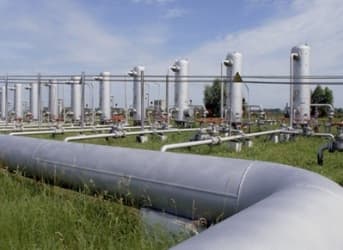The energy relations between Iran and Pakistan are a marriage made in heaven, except for international politics.
Pakistan’s current energy deficit problems are severe and increasing. Pakistan’s most respected English-language newspaper, “Dawn,” recently headlined an article, “Pakistan, Nuclear-armed but short of electricity” before noting, “Power can be out for up to 20 hours a day in the summer… The shortfalls that became the no. 1 issue in the recent election are estimated at 3,500 to 6,000 megawatts, up to a third of total demand.”
Pakistan’s ramshackle and investment starved private power companies have roughly 50 percent less electricity generation capability than the actual demand, leaving Pakistan’s National Grid facing more than a 5,000-megawatt shortfall in power generation, leading to blackouts (referred to in the Pakistani press as “load shedding”) in both urban and rural areas of the country.
Combined with rampant theft of electricity and massive corruption in the country’s power sector, Pakistan’s ongoing energy shortages are unlikely to end anytime soon, whatever Islamabad does. The country’s crisis peaked on 24 February, when a fault at one power station cascaded into multiple plant shutdowns and plunged the entire nation into darkness, with authorities warning that the power crisis would deepen as the summer approached. In June, “load shedding” led to blackouts of up to 18 hours in urban areas and up to 22 hours of outage in rural areas. Pakistan currently produces roughly 11,000 megawatts of electricity, but the country needs more than 17,000 megawatts of power to meet the rising demand of a growing population.
Related article: Canada's LNG Dream – Racing Ahead…at a Snail's Pace
So, where to make up the electricity shortfall, short and long term?
Foreign investment, but here, Pakistani nationalism has hardly improved the situation.
Just a couple of months ago, the newly-elected government of Prime Minister Nawaz Sharif declared that it would leave no stone unturned to improve relations with India, which was reciprocated by New Delhi when an expert group of Indian Power Ministry led by Joint Secretary Rita Acharya visited Pakistan in June and offered building a series of high power voltage lines to transmit 500 megawatts of electricity to Pakistan, but conservative elements in the Pakistan’s Foreign Office apparently torpedoed the plan, leading a major Pakistani energy mogul to declare, “History will never forgive and spare those evil elements who have done such a huge disservice to the motherland by succeeding in having this project discarded. They’ll be exposed and become an example of horror for the entire mankind. You just wait here and see how the truth would take its course to expose the extremist mindset in our security ranks. This is an unpardonable crime that would never be forgiven.”
Enter China, increasingly the world’s fiscal investment savior and Iran, seeking to circumvent increasingly stringent foreign sanctions imposed on the country for its purported cover nuclear weapons program.
Despite Washington’s displeasure, Pakistan has been engaged in discussion with Iran to construct a $7.5 billion “Peace Pipeline” to deliver 21.5 million cubic meters of natural gas a day to Pakistan from Iran’s massive offshore Persian Gulf South Pars field, currently being developed in conjunction with Qatar.
In March U.S. State Department spokesman Victoria Nuland, in response to a question about the pipeline, stated that “We have serious concerns if this project actually goes forward that the Iran Sanctions Act would be triggered.”
Related article: The Battle for Balcombe
But China’s possible entry to the pipeline project moves the diplomatic chess game to a new level, as Beijing is interested in participating in the extension of the proposed Iran-Pakistan natural gas pipeline to China.
Building on China’s development of Pakistan’s Arabian Sea Gwadar port, Pakistani and Chinese officials on 26 August meeting in Islamabad will discuss building a natural gas pipeline from Gwadar to western China, along with possibly constructing an oil pipeline between the two nations. During the meeting the two countries will sign a memorandum of understanding on the economic corridor, which has already been approved by Pakistan’s cabinet in the wake of Prime Minister Nawaz Sharif's visit to China in July.
The talks put Washington between sanctions and a hard place. Browbeating Islamabad by threatening sanctions while dropping drone strikes on the country is one thing, interfering with Chinese energy policies quite another. While predicting Washington’s future policy is a fool’s game, the advent of Beijing into the “Peace Pipeline” complicates Washington’s options at the very least.
By. John C.K. Daly of Oilprice.com


















